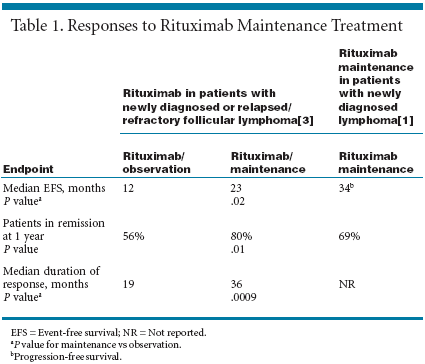Rituximab Maintenance Therapy Improves Event-Free Survival and Duration of Response in Patients With Follicular Lymphoma
This special supplement to Oncology News International includes updated results of studies with anti-CD20 therapy and other targeted therapies in the treatment of lymphomas, chronic lymphocytic leukemia, and immune thrombocytopenic purpura. The results were presented at the American Society of Hematology 44th Annual Meeting in Philadelphia, December 6 to 10, 2002.
BERN, Switzerland-In patients with follicular lymphoma, rituximab (Rituxan) retreatment after relapse often produces response rates at least as great as those following initial treatment.[1,2] This has led to speculation that extended or maintenance therapy with rituximab may prolong the duration of the initial response. Michele Ghielmini, MD, and colleagues with the Swiss Group for Clinical Cancer Research (SAKK), based in Bern, Switzerland, have investigated rituximab induction and maintenance therapy in 202 patients with newly diagnosed or resistant/relapsed follicular lymphoma (ASH abstract 604).[3] Updated data show that the response rate after induction therapy (375 mg/m2/week for 4 weeks) among 185 evaluable patients was 67% in newly diagnosed patients and 46% in patients who had received previous therapy.[3] Patients who responded or achieved stable disease were ran domized at week 12 to observation and no further treatment or to rituximab maintenance (375 mg/m2 every 8 weeks). Maintenance vs Observation
A total of 151 patients were randomized to rituximab maintenance or observation. The patient and baseline disease characteristics for the two treatment groups were well balanced. Median age was 57 years; 97% of patients had a performance status of 0 or 1; 85% had stage III or IV disease; 52% had bone marrow involvement; 30% had elevated levels of lactate dehydrogenase; and 18% had received prior radiation therapy. After a median follow-up of 35 months, the median event-free survival was 23 months for the rituximab maintenance group and 12 months for the observation group (P = .02) (see Table 1).[1,3] This difference was more pronounced for patients who were chemotherapy naive (36 months vs 19 months for observation only; P = .009). The majority of patients (80%) in the maintenance group were still in remission compared with 56% of those in the observation group (P = .01). Thirty-four patients in this study improved the quality of their response, with the complete response rate increasing from 10% to 29%. Circulating B-cell counts returned to within 65% of baseline in patients in the observation group compared with 33% for those in the rituximab maintenance group (P = .04). Immunoglobulin G, A, and M levels remained stable in the plasma of patients in the observation arm, while the Ig M level was significantly lowered in the maintenance arm, and infectious complications were rare and similar for both treatment groups. In summary, the addition of rituximab maintenance therapy at 2- month intervals reduced the risk of relapse by 55% for responding patients and significantly improved the remission rate at 1 year with no additional toxicity. The authors concluded that this randomized study confirms the efficacy of maintenance rituximab in patients with follicular lymphoma. Results Corroborated Another study showing the benefits of maintenance therapy for delaying or preventing relapse in rituximab- sensitive patients was recently published in the Journal of Clinical Oncology. In that study, John Hainsworth, MD, of the Sarah Cannon Cancer Center in Nashville, Tennessee, and others reported results of a 6-month rituximab maintenance regimen in patients with newly diagnosed follicular small cleaved, follicular mixed, or small lymphocytic lymphoma.[ 1]

Similar to the study presented by Dr. Ghielmini,[3] patient responses improved after maintenance therapy, with 18 patients converting from stable disease or partial response to complete response after receiving maintenance therapy. The actuarial progression-free survival was 34 months after a median of 30 months of follow-up (see Table 1). The ideal schedule for rituximab maintenance therapy in patients with newly diagnosed vs relapsed or refractory non-Hodgkin's lymphoma has not yet been identified.
References:
1. Hainsworth JD, Litchy S, Burris HA III, et al: Rituximab as first-line and maintenance therapy for patients with indolent non-Hodgkin’s lymphoma. J Clin Oncol 20:4261-4267, 2002.
2. Davis TA, Grillo-Lopez AJ, White CA, et al: Rituximab anti-CD20 monoclonal antibody therapy in non- Hodgkin’s lymphoma: safety and efficacy of re-treatment. J Clin Oncol 18:3135-3143, 2000.
3. Ghielmini M, Hsu Schmitz S-F, Cogliatti S, et al: Prolonged treatment with rituximab significantly improves event free survival and duration of response in patients with follicular lymphoma: a randomized SAKK trial (abstract 604). Blood 100:161a, 2002.
Highlighting Insights From the Marginal Zone Lymphoma Workshop
Clinicians outline the significance of the MZL Workshop, where a gathering of international experts in the field discussed updates in the disease state.